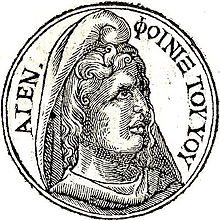Phoenix (son of Agenor)
| Phoenix | |
|---|---|
 Phoenix from Guillaume Rouillé's Promptuarii Iconum Insigniorum | |
| Abode | Phoenicia |
| Personal information | |
| Parents | Agenor and Telephassa |
| Siblings | Cadmus, Cilix, Europa |
| Consort | Cassiopeia, Alphesiboea |
| Children | Carme, Cilix, Phineus, Doryclus, Adonis |
In Greek mythology, Phoenix or Phoinix (Ancient Greek: Φοῖνιξ Phoinix, gen.: Φοίνικος means "sun-red") is the eponym of Phoenicia who together with his brothers were tasked to find their abducted sister Europa.
Family[edit]
Phoenix was a son of Agenor by either Telephassa, Argiope,[1] or Damno[2] and brother of Cadmus, Cilix, and Europa.[1][3] He was believed to have fathered a number of children with different women. By Cassiopeia, Phoenix had a daughter Carme[4] and three sons: Cilix, Phineus, and Doryclus[citation needed], as well as a stepson Atymnius, whose natural father was Zeus;[5] by Alphesiboea, he had Adonis.[6] He was also credited as the father of Cepheus, king of Ethiopia and husband of another Cassiopeia.[7]
According to the Iliad, Europa was not Phoenix's sister, but his daughter,[8] while Cadmus was identified as his son.[9] Europa is otherwise called one of his two daughters by Perimede, daughter of Oeneus, the other one being Astypalaea;[10] she is also included on the list of his children by Telephe, her siblings in this case being Peirus, Phoenice, and Astypale (apparently identical to the aforementioned Astypalaea).[11] Telephe, daughter of Epimedusa, is probably the same as Telephassa, whom Moschus[12] calls wife and not the mother of Phoenix.
| Relation | Names | Sources | ||||||||||||||
|---|---|---|---|---|---|---|---|---|---|---|---|---|---|---|---|---|
| Hes. | Hom. | Sch. Ili. | Pher. | Hella. | Bac. | Sch. on Eur. | Mosc. | Con. | Apollod. | Hyg. | Pau. | Anton. | Non. | Tzet. | ||
| Parents | Agenor and Damno | ✓ | ||||||||||||||
| Agenor and Telephassa | ✓ | |||||||||||||||
| Agenor and Argiope | ✓ | |||||||||||||||
| Agenor | ✓ | |||||||||||||||
| Belus | ✓ | ✓ | ||||||||||||||
| Wife | Cassiopeia | ✓ | ✓ | |||||||||||||
| Telephassa | ✓ | |||||||||||||||
| Telephe | ✓ | |||||||||||||||
| Alphesiboea | ✓ | |||||||||||||||
| Perimede | ✓ | |||||||||||||||
| Children | Europa | ✓ | ✓[13] | ✓ | ✓ | ✓[13] | ✓ | ✓ | ✓ | ✓[14] | ✓ | |||||
| Phineus | ✓ | |||||||||||||||
| Astypale | ✓ | ✓ | ✓ | |||||||||||||
| Phoenice | ✓ | |||||||||||||||
| Peirus | ✓ | |||||||||||||||
| Cadmus | ✓ | ✓ | ✓ | |||||||||||||
| Thasus | ✓ | |||||||||||||||
| Adonis | ✓ | |||||||||||||||
| Cepheus | ✓ | |||||||||||||||
| Carme | ✓ | |||||||||||||||
Mythology[edit]
When Europa was carried off by Zeus, her three brothers were sent out by Agenor to find her, but the search was unsuccessful. Phoenix eventually settled in a country in Asia which he named Phoenicia after himself.[3][15]
Argive family tree[edit]
Notes[edit]
- ^ a b Hyginus. Fabulae, 6 & 178
- ^ Gantz, p. 208; Pherecydes fr. 21 Fowler 2000, p. 289 = FGrHist 3 F 21 = Scholia on Apollonius Rhodius, Argonautica 3.1177-87f.
- ^ a b Pseudo-Apollodorus. Bibliotheca, 3.1.1
- ^ Antoninus Liberalis, Metamorphoses, 40
- ^ Scholia on Apollonius Rhodius, Argonautica, 2. 178
- ^ Pseudo-Apollodorus, Bibliotheca, 3. 14. 4
- ^ Hyginus. Astronomica, 2.9.1
- ^ Homer, Iliad, 14. 321
- ^ Scholia on Homer, Iliad B, 494, p. 80, 43 ed. Bekk. as cited in Hellanicus' Boeotica
- ^ Pausanias, Description of Greece, 7. 4. 1
- ^ Scholia on Euripides, Phoenician Women, 5
- ^ Moschus, Idylls, 2. 42
- ^ a b Though Europa was unnamed in this text, she was definitely the daughter of Phoenix who coupled with Zeus.
- ^ Europa's mother was not named by Apollodorus, if her father was Phoenix.
- ^ Hyginus, Fabulae, 178
| This article relating to Greek mythology is a stub. You can help Wikipedia by expanding it. |
References[edit]
- Fowler, Robert. L. (2000), Early Greek Mythography: Volume 1: Text and Introduction, Oxford University Press, 2000. ISBN 978-0198147404.
- Gantz, Timothy, Early Greek Myth: A Guide to Literary and Artistic Sources, Johns Hopkins University Press, 1996, Two volumes: ISBN 978-0-8018-5360-9 (Vol. 1), ISBN 978-0-8018-5362-3 (Vol. 2).